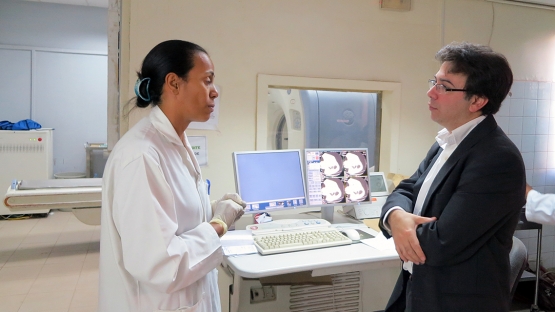Investments in addressing cancer in Africa lag significantly behind efforts to combat high profile infectious diseases such as Human Immunodeficiency Virus (HIV), tuberculosis and malaria. Mauritania, however, has been countering this trend for a while, and made important strides forward since the establishment of its National Oncology Centre in 2008, supported by the IAEA.
It is estimated that Mauritania has over 1800 new cases of cancer each year, which claim the lives of approximately 1300 people. A 2012 study anticipates that cancer cases and deaths will increase by more than 50% in the next 15 years in the country. Without a national cancer control plan and with limited public access to health care services, Mauritania recognizes that it faces a looming health crisis.
The Government of Mauritania requested an imPACT review mission in 2015, seeking specific expert advice regarding the increasing challenge of cancer cases being diagnosed at advanced stages. In December of the same year, the IAEA's Programme of Action for Cancer Therapy (PACT) coordinated a team of international experts nominated by the World Health Organization (WHO), the International Agency for Research on Cancer (IARC), and the IAEA's Division of Human Health, who assessed Mauritania's capacities for comprehensive cancer control. The expert team visited a number of public and private institutions as well as primary health care clinics and NGO facilities, and subsequently identified the most pressing priorities for the country's cancer control strategy.
The establishment of a national cancer registry was identified as a crucial first step. A cancer registry is required to record and analyse cancer cases and deaths. Reliable cancer data are the basis for statistical analyses that enable informed decision-making with regard to priority interventions and investments.
The team noted indeed that most cancer cases in Mauritania are diagnosed at an advanced stage, which suggests that increased efforts are needed in the area of prevention and early detection. With approximately 80% of cancer cases diagnosed at an advanced stage, the experts also emphasized the importance of quality palliative care, including psychosocial support, which up to now relied largely on family members and NGOs, and the availability of morphine for painkilling purposes.
"One important step is to formally appoint a Coordinator for the National Programme against Cancer who oversees and monitors its implementation" said Dr Niang Saidou Doro, WHO Country Office's non-communicable diseases coordinator, who accompanied the expert team. The mission findings and recommendations will be reflected in the National Cancer Control Plan that is currently under review.
Other measures proposed to significantly decrease the national cancer burden - in a cost-effective manner - included: the implementation of legislative measures and healthcare policies to reduce tobacco use and improve the coverage of Human Papillomavirus (HPV) and Hepatitis B Virus (HBV) vaccinations, the establishment of an integrated diagnostic management programme, and improved training for medical and paramedical professionals.
This imPACT review forms part of the IAEA's continued support to Mauritania in the area of cancer control. Further assistance is provided, for example, in strengthening of national capacities in radiation medicine and radiation protection, and in mobilising resources for cancer control activities.


